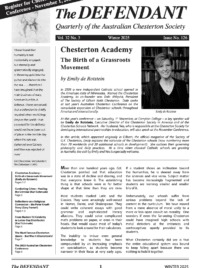One of the most common aphorisms attributed to Chesterton speaks of the pervasive credulity of modern society arising from the abandonment of belief in God. It has been cited in various forms, perhaps most commonly as:
When a man ceases to believe in God, he doesn’t then believe in nothing, he believes in anything.
Seeking the origins of the statement tests the forensic enthusiasm of any reader of Chesterton. The Society of Gilbert Keith Chesterton’s Quotemeister has explored this at length, and it is detailed on the Society’s website. But the oft-quoted wording has so far eluded clear identification.
The puzzle of a ‘sourceless’ quotation was first raised by the Chesterton scholar, Aidan Mackey. Soon afterwards, the Chesterton bibliographer, Geir Hasnes, brought to light an interview with the Italian novelist, Umberto Eco, who said that he had based his novel, Foucault’s Pendulum, on this very epigram.
Dr Pasquale Accardo of New York tracked the quotation back to its earliest known appearance – in the 1937 study of Chesterton by Emile Cammaerts, The Laughing Prophet, in this form:
The first effect of not believing in God is to believe in anything.
While the quotation itself has remained untraceable in Chesterton’s writings, there are various hints in his cavernous output of such an insight. Certainly it sounds like something Chesterton would have said.
And, if we consider how extravagant his talent was, how so many of his memorable insights did not appear in his ‘greatest’ books (such as Orthodoxy and The Everlasting Man), and how difficult it has been – as Geir Hasnes has testified – to unearth all of Chesterton’s output (perhaps especially such utterances that were made in his radio broadcasts, which have now been lost, and his off-the-cuff interviews), then we gain some idea of how an oft-quoted statement remains elusive.
The American scholar, John Peterson, has argued that the quote is a blend of three separate passages:
There may have been a time when people found it easy to believe in anything. But we are finding it vastly easier to disbelieve anything.
Illustrated London News, March 21, 1914
The nineteenth century decided to have no religious authority. The twentieth century seems disposed to have any religious authority.
Illustrated London News, April 26, 1924
A man who refuses to have his own philosophy will only have the used-up scraps of somebody else’s philosophy.
‘The Revival of Philosophy’, The Common Man, 1950
An alternative suggestion has come from Robin Rader of Zambia – that the epigram emerges from two adjacent Father Brown stories:
It’s the first effect of not believing in God that you lose
The Oracle of the Dog, 1923
your common sense.
You hard-shelled materialists were all balanced on the
The Miracle of Moon Crescent, 1924
very edge of belief – of belief in almost anything.
Certainly there is a coincidence of wording between Cammaerts’ version and that cited by Ms. Rader. Both contain the words, ‘…the first effect of not believing in God…’ Cammaerts was discussing this very story, “The Oracle of theDog,” when he quoted Father Brown:
It’s drowning all your old rationalism and scepticism, it’s coming in like a sea; and the name of it is superstition.’ The first effect of not believing in God is to believe in anything: ‘And a dog is an omen and a cat is a mystery.’
The elusive words, it is worth noting, lie embedded between two quotations. It is not presented as a quotation, but as a paraphrase. The switch is easy to miss in the original text.
In his 1970 book, The Mind of Chesterton, Christopher Hollis presents the epigram as:
As Chesterton said, ‘He who does not believe in God will believe in anything.‘
Hollis lists only 13 books in his bibliography of secondary sources, The Laughing Prophet being among them.
The Chesterton Society’s Quotemeister believes that the source of the fugitive quotation is Emile Cammaerts. His ambiguous typography misled Christopher Hollis, and through him others (including, at last, all of the rest of us), into the mistaken conviction that a thought repeated over and over by Chesterton had a specific epigrammatic form that Chesterton never precisely gave it.
The Quotemeister further believes that the source of the fugitive epigram is ‘The Oracle of the Dog,’ as codified by Emile Cammaerts. And it notes a nice irony – that so many critics have chastised Chesterton over the years for misquoting other writers, and yet he is now himself the most misquoted writer of all!
Perhaps the irresistible conclusion is – to adapt Voltaire’s famous statement about God – that, if the quotation were not Chesterton’s, it would be necessary to attribute it to him!
This report on the Chesterton quote appeared in the Winter 2016 issue of The Defendant, and is reprinted here because of the continuing popularity of the quote.
